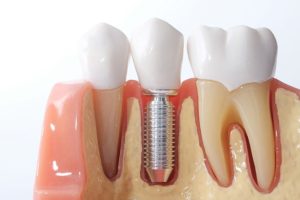Implantology
Implantology – what is it?

Implantology – indications and contraindications
Indications
Contraindications
The excellence of modern tooth implants makes the indications for their use very wide and include single missing teeth (especially the front teeth – punctured, removed due to caries or the inborn lack of a tooth, where we want to save neighbouring teeth – in the case of a traditional bridge, the neighbouring teeth need to be grinded, which weakens them), as well as the lack of many teeth, until complete toothlessness. For toothless patients we have special “All-on-four” procedure, which consists of introducing 4 implants in the maxilla and 4 in the mandible, and then placing prosthetic restorations on them. The dentures fit into the implants as a clip, reduce discomfort caused by poorly fitting and loose dentures.
Currently, the majority of contraindications to implantation is relative and concerns general diseases, when special precautions are required. Implants are also not used for children, due to the fact that they permanently connect to the bone, which may cause stunting of its growth (there is slow but steady bone growth until 18-20 years). Sometimes significant bone loss makes introduction of implants impossible, but there are methods to improve implantation conditions: such as bone augmentation or use of short implants.
Implantology – types of treatments
We offer patients implant treatment for over a decade. In our clinic we use the best systems in the world and provide experience of outstanding specialists. In addition to simple implantation, we perform also augmentation of the floor of the maxillary sinus and alveolar ridge augmentation in preparation to receive and retain a dental prosthesis. During implantation, crucial is so-called soft tissue management: shaping gums around the implants to obtain an aesthetic final result. For this purpose, we use, transplants from the palate, painless for the patient and performed during the implantation procedure. We also carry out the so-called immediate implantation: implant placement immediately after extraction.
Treatment with implants – the course of the procedure
Before each implantation the CBTC-picture has to be taken (so-called cone beam computed tomography), which involves a much lower radiation dose than normal tomography, while providing a possibility of 3D visualization and an extremely accurate x-ray image that allows the physician to precisely design the entire procedure. After a written consent for the treatment, local anesthesia is performed and the procedure is carried out completely painlessly, in comfortable conditions. Finally, the doctor puts the sutures and presents to the patient a list of postoperative recommendations, which should be strictly applied to prevent the loss of the implant. What is important, the patient never leaves our clinic without a tooth – for the time of implant fixation temporary restoration is prepared. Usually, after a week, you should take a control visit during which the stitches are removed. After the healing process, prosthetist takes care of the patient and prepares the final prosthetic restoration.
Implantology – location
If you are interested in performing teeth implants, please report to our dental office located at street Ks. P. Wawrzyniaka 36a (Krzyki) in Wrocław.
Implantology – frequently asked questions (FAQ)
Pricing
| Implant consultation (deducted from the cost of surgery) | 200 PLN |
| Insertion of 1 implant | Starting at 3000 PLN |
| Insertion of 1 miniimplant | Starting at 1500 PLN |
| Bone tissue regeneration | Starting at 3000 PLN |
| Raising the bottom of the maxillary sinus | Starting at 5000 PLN |
| All-ceramic crown for implant CEREC system | 3200 PLN |
| Metal crown faced with porcelain screwed | 2700 PLN |
| Denture ALL IN FOUR | 22500 PLN |
